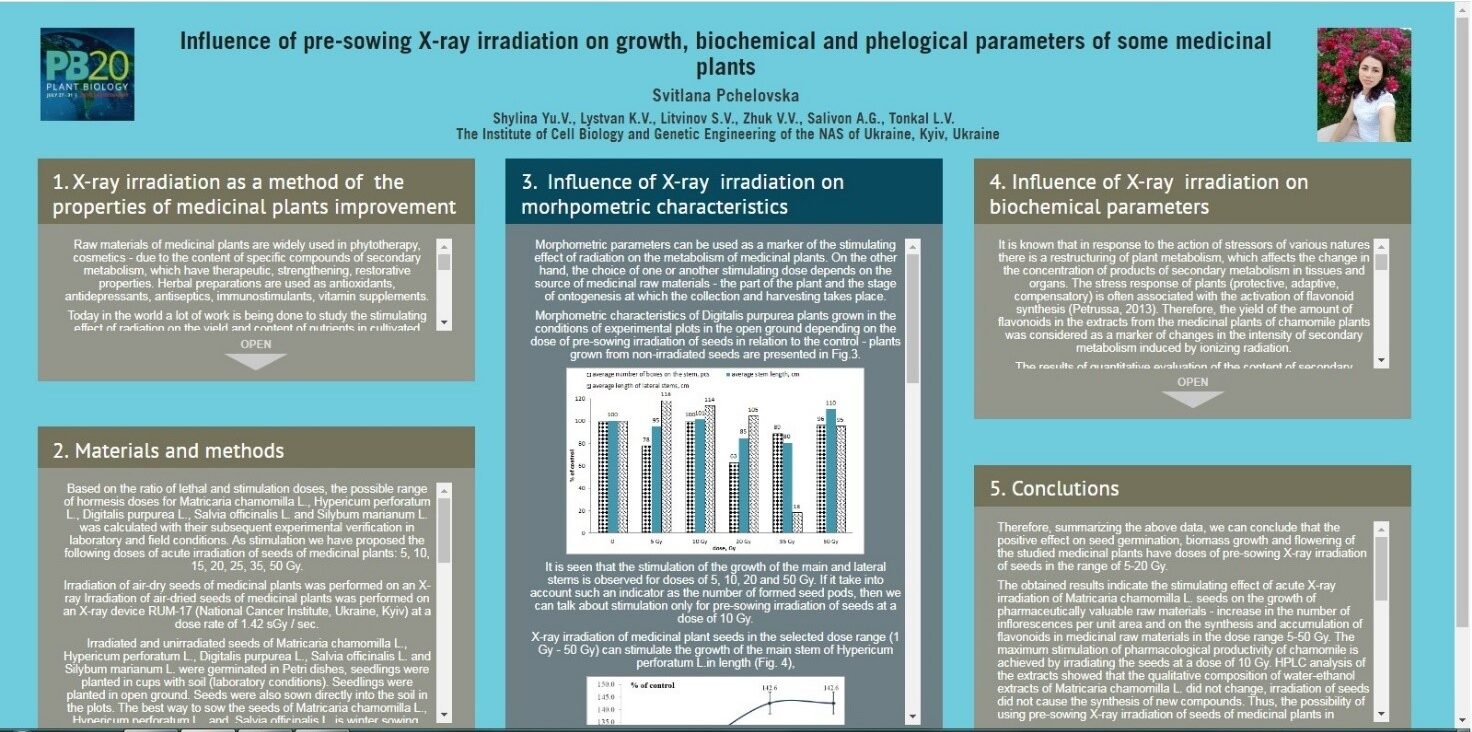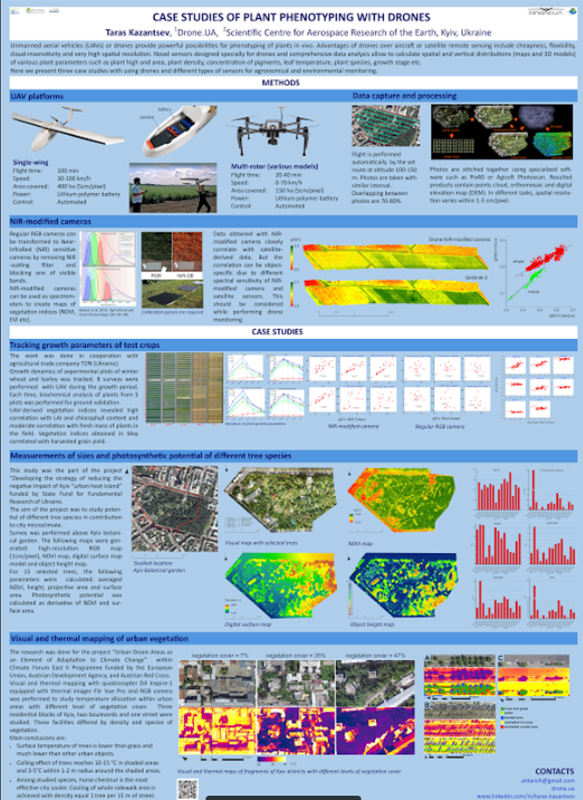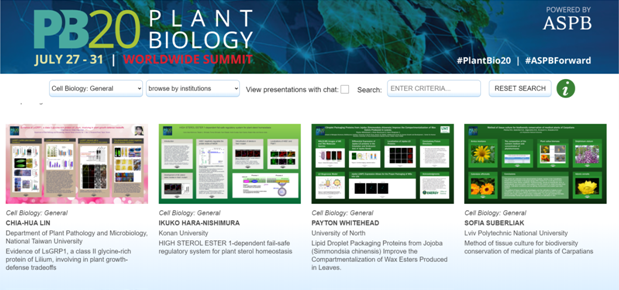Two teams of scientists from Ukraine - one from the Lviv Polytechnic National University and the other from the Institute of Cell Biology and Genetic Engineering - took part in this year's Plant Biology Worldwide Summit 2020 (July 27-31, 2020) online conference. Here are their impressions of the event:
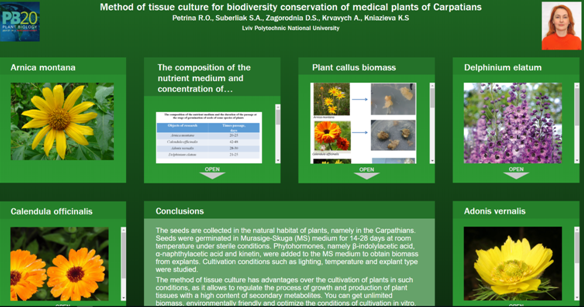 The Plant Biology PB2020 conference is our first experience of an online conference. Many interesting reports on the current state of plant biology were presented during the conference.
The Plant Biology PB2020 conference is our first experience of an online conference. Many interesting reports on the current state of plant biology were presented during the conference.
The reports were of various levels - both for experienced scientists and for beginners. Many scientists from around the world presented their work. This format of the conference encourages you to be more attentive and not be distracted.
Our team presented a poster on "Method of tissue culture for biodiversity conservation of medical plants of Carpathians."
A chat was available during all presentations, where you could ask questions to the speaker or discuss the topic with other listeners. The moderators were very friendly and encouraged everyone at the seminars. It was very interesting and informative.
This was a great opportunity to participate in a high-level virtual conference, listen to reports in real time, and communicate with other participants. Participation in the conference also helped us to establish new contacts and plan further research in this area.
-Romana Petrina, Associate Professor of Department of Technology of Biologically Active Substances, Pharmacy and Biotechnology, Lviv Polytechnic National University
This summer a team from our Institute of Cell Biology and Genetic Engineering, NAS of Ukraine, attended the annual Plant Biology Worldwide Summit 2020. The event was planned to be held in Washington, DC, but because of the coronavirus pandemic it was transformed into a virtual online meeting. Plant Biology Worldwide Summit is organized by the American Society of Plant Biology and is one of the biggest events for plant biologists, gathering top researchers in plant science from all over the world. The organization of the meeting was carried out on the high level, and I feel that all the members of our team were satisfied with their participation in the Summit.
A few words about the PBWS format: plenary and section lectures were shown in real time with subsequent questions and discussions and were rebroadcasted on the next day for countries of different time zones. As an additional bonus, all oral and poster presentations will be available for viewing during the next year. The program was full during all five days and encompassed different areas of plant biology: gene regulation, signaling pathways, response to abiotic and biotic stress, plant metabolites, plant immunity, machine learning, synthetic biology, biotechnology and molecular breeding, developmental biology, etc. I sometimes found it difficult to choose a preference between lectures and sessions. It was my second online conference this year and I really liked both.
We all thank the US-Ukraine foundation Biotech Initiative for supporting us with grants for attendance in the Summit.
-Yana Sindarovska, PhD, researcher, Institute of Cell Biology and Genetic Engineering NASU, Kyiv, Ukraine
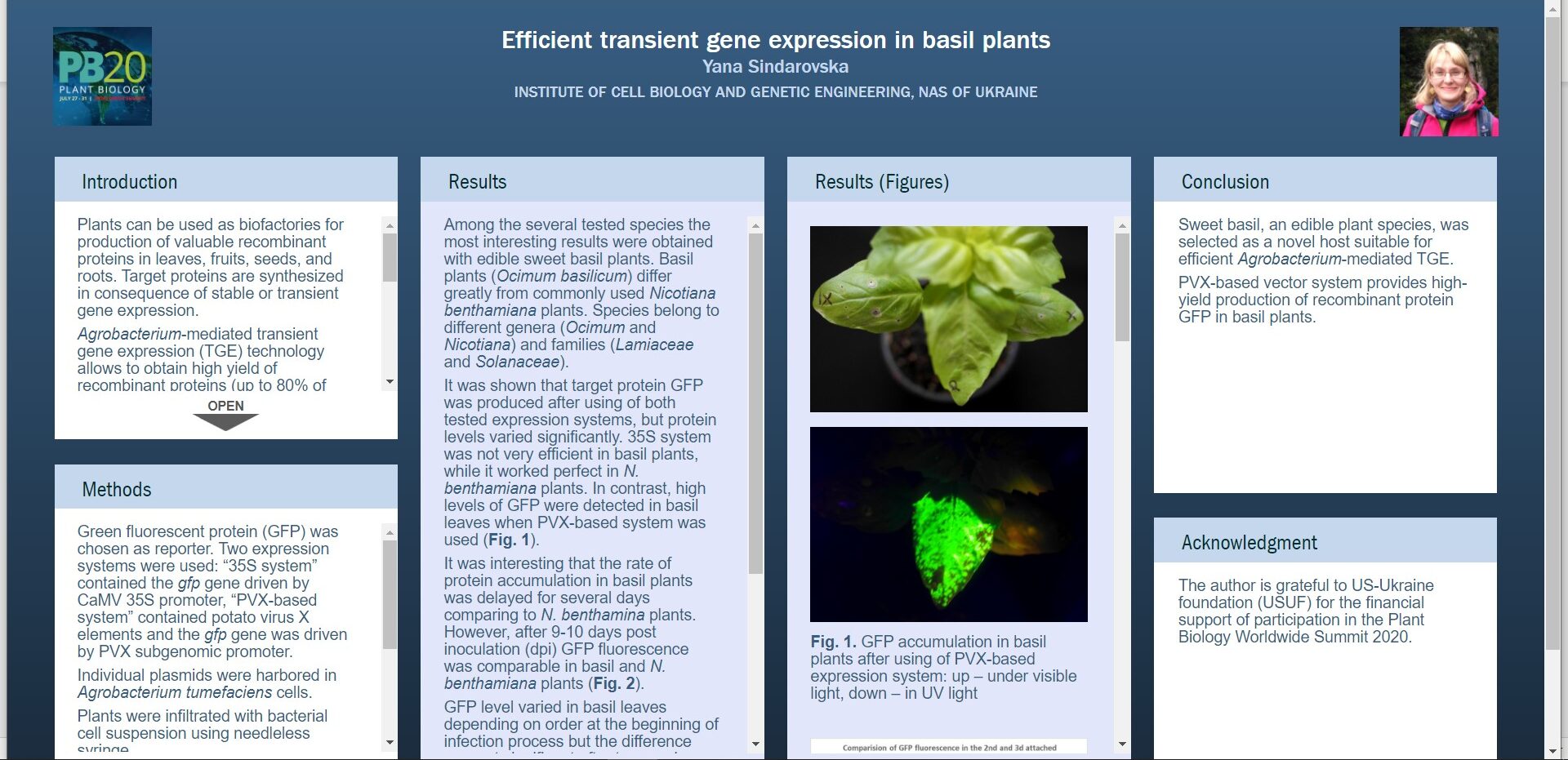
“Plant Biology Worldwide Summit was well organized. I liked that the oral presentations were highly informative. My current research work is related to the mechanisms of plant resistance to biotic stresses, so I would like to highlight all sectional symposia on the topics: Plant-Animal Interactions: Basis for Host-Resistance (Prof. M. Clark, University of Utah, “Molecular-genetic basis of maize resistance to spider mite herbivores”; Prof. G. Jander, Boyce Thompson Institute, “An improved Nicotiana benthamiana strain for aphids and whitefly experiments”); Plant-Microbe Interactions (Dr. S. Basak, Bose Institute “Tomato metacaspases MC1 and MC5 are mediators of cell death during development and disease”); Plant-bacterial interactions (Dr. J.M. Jacobs, Ohio State University, “Evolutionary and biological basis of bacterial vascular pathogenesis of plants”); and Biochemistry: specialized metabolites (Dr. A. Huffaker, UC San Diego, “Genetic and biochemical deconvolution of pathways controlling maize immunity”).
For many years I have been researching the effect of heterological desaturases on plant resistance to abiotic stress factors, and I found a few interesting lectures related to this topic, presented by Eva Farré, Dr. rer. Nat (“Aureochromes mediate blue light regulation of fatty acid desaturase expression in the stramenopile Nannochloropsis oceanica”), Zhan Li, PhD, Cornell University (“A lipid-associated protein MORN1 is a novel regulator of plant growth and stress tolerance”), and Mark Johnson, PhD, Brown University (“Understanding the molecular basis of thermotolerant reproduction in tomato”).
Since we had a time difference with the US and concurrent symposia were broadcast at the same time, it was not convenient to view all the presentations via online mode. However, thanks to the organizers we can access the presentations for a year.
Participation in meetings like this provides new information for reflection and understanding of the importance of your work.”
-Tetiana Kyrpa-Nesmiian, PhD, researcher, Institute of Cell Biology and Genetic Engineering NASU, Kyiv, Ukraine
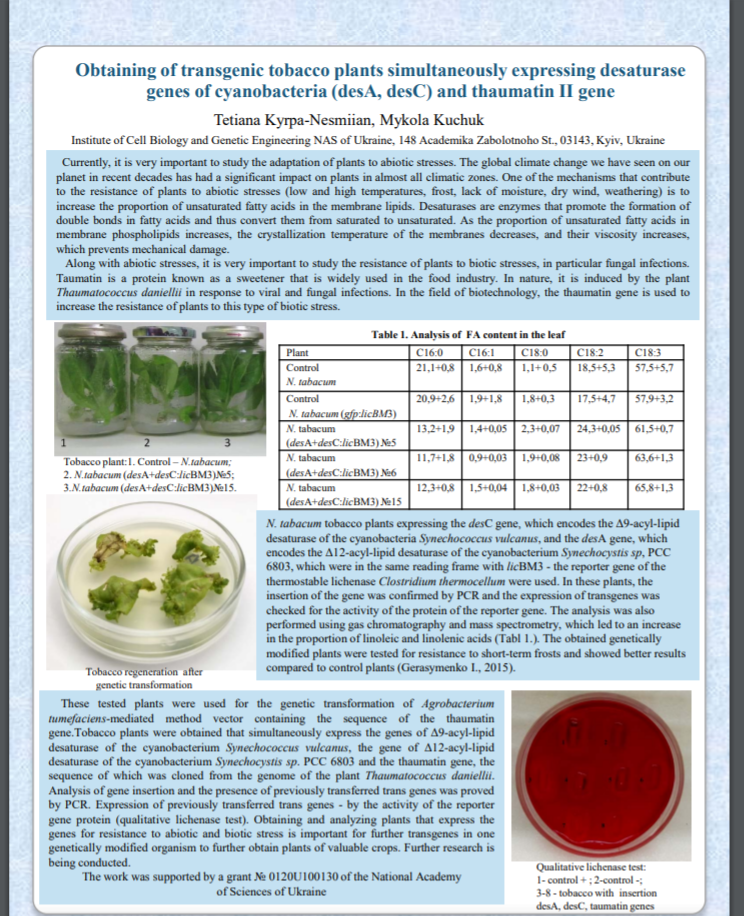
“I took part in the Summit for the first time and my impressions of this event are wonderful. It is remarkable that the organizers of the Summit in the pandemic conditions found an opportunity to hold it online. The chosen format of the Summit turned out to be successful, since it made it possible to participate in various events (lectures, posters).
My colleagues and I presented the results of our work in the field of plant genetic engineering (“Hairy” roots of medicinal plants against COVID-19: New application of plant biotechnology“). The work includes different aspects and is aimed to study the possibility of using plant-derived compounds for treatment of disease.
It was particularly good to take the possibility to analyze numerous lectures during several days at a time when it was convenient for me. I found the posters very interesting. The work of A.R. Queiros, X. Cai, C. Blevins, So-Eun Kim, N.D. Tivendale caught my attention. Especially interesting for me was the work presented by a group led by Dr. Paolo from the Institute of Agricultural Biology and Biotechnology, Italy. I think that I will find the collaboration with the colleagues from different countries as well.”
-Nadiia Matvieieva, DrSci, senior scientist, head of the Laboratory of Adaptational Biotechnology, Institute of Cell Biology and Genetic Engineering NASU, Kyiv, Ukraine
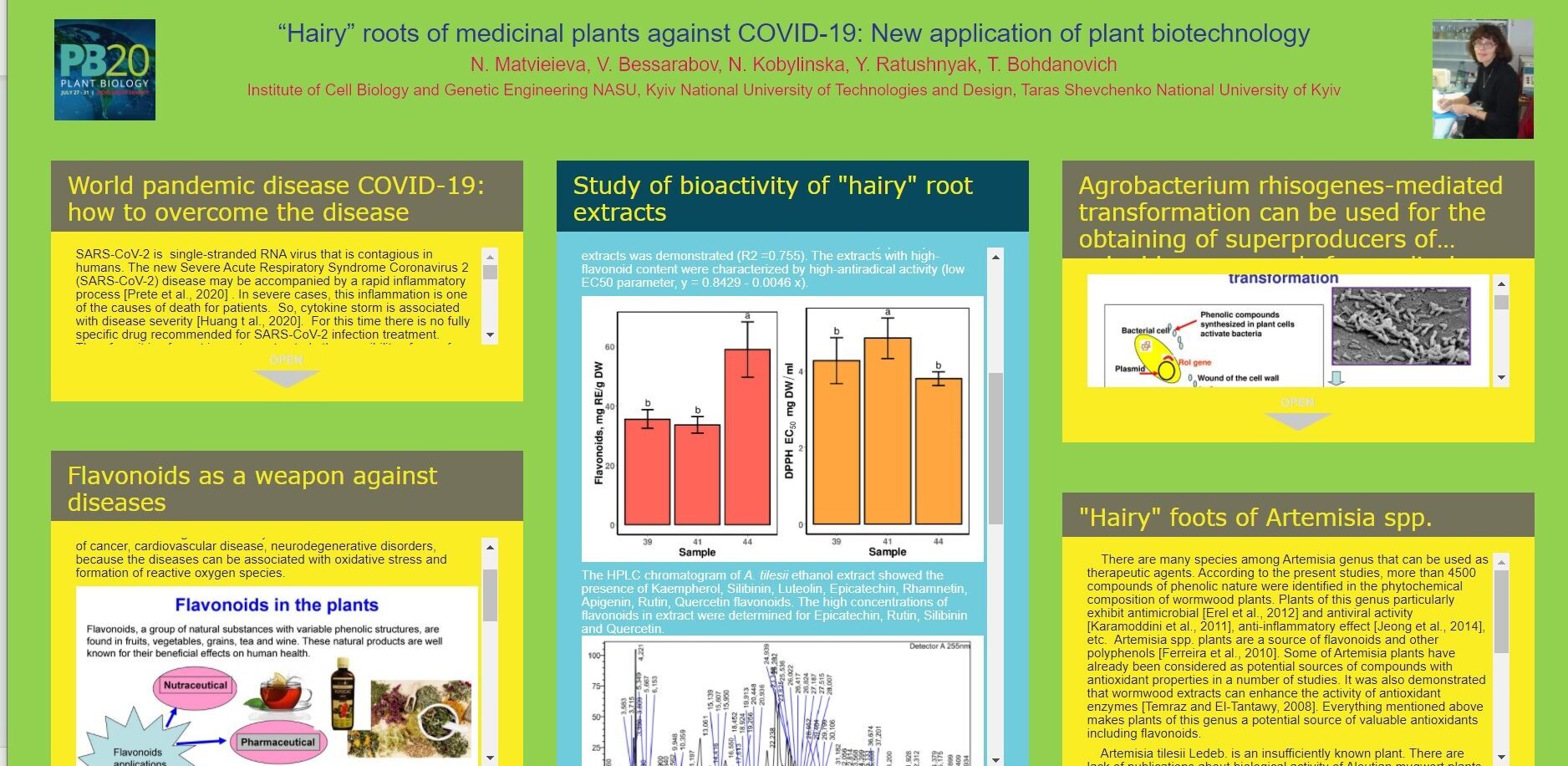
“Many thanks to the organizers for the opportunity to take part in Plant Biology 2020 Worldwide Summit. This provided a chance to get acquainted with the work of other scientists, visit workshops, and present our own results in a poster form. It was interesting and useful to listen to the reports, in particular: Sabarinath Subramaniam (“TAIR bioinformatics resources”), Nathan Dunn (“Adding functional annotations to Apollo”), Tianhu Sun (“A highly conserved orange protein elevates photosynthesis potential by regulating light-harvesting pigment biosynthesis”), Sajina Bhandari (“Seed oil biosynthesis: lesquerella does it a unique way”), Veronica C. Perez (“The plant metabolite phenylacetaldoxime is a precursor for the phytohormone phenylacetic acid”), Nan Jiang “Synergy between the anthocyanin and RDR6/SGS3/DCL4 siRNA pathways expose hidden features of Arabidopsis carbon metabolism,” Alisa Huffaker (“Genetic and biochemical deconvolution of pathways controlling maize immunity”), Manikandan Ramasamy (“Modulation of salicylic acid receptor activity confers resistance to potato zebra chip disease”).
I also noted a few interesting workshops: “Get your message across: a guide to artwork and illustrations for better impact and clarity,” “Communicating for impact: conversing with congress; USDA, DOE, NSF & USAID grant information session,” and “Discovering the rules of life through computational plant biology – utilizing dynamical mathematical models at the molecular, organisms.”
This is the first time I have participated in such a large international conference. It was unusual due to the time difference, but very interesting and informative due to the wide range of works presented.”
-Svitlana Pchelovska, PhD, senior scientist, Institute of Cell Biology and Genetic Engineering NASU, Kyiv, Ukraine
